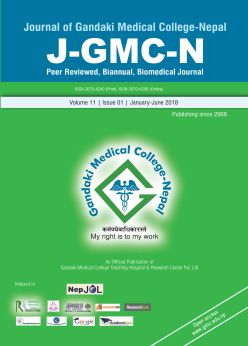A Critical Analysis on Hospital Waste Management at Bandipur Hospital, Bandipur, Tanahu District, Nepal
DOI:
https://doi.org/10.3126/jgmcn.v11i02.22961Keywords:
Bandipur Hospital, Hospital waste, Waste managementAbstract
Background: Hospitals generate large volumes of wastes as a byproduct of a variety of health services and procedures carried out such as surgery, dressing of the wounds, dialysis, deliveries, laboratory and dental procedures, postmortem procedures etc. Such a waste may be infectious or non-infectious. If such a waste is not collected, transported and disposed off, it not only results in causation of ‘Hospital Acquired Infections” but also poses a major public health hazard by causing pollution of air, water and soil.
Objective: This study objective was to critically analyze current waste management system in Bandipur Hospital, Tanahu District, Nepal and critically review the findings.
Methods: For the critical analysis on waste management, literature review on hospital waste management was done. The techniques used for critical analysis were observation using observation checklist and interview with hospital manager, doctors, staff nurses, and local people living nearby the hospital. Tool of this critical analysis was SWOT analysis.
Results: It can be seen from SWOT analysis that, most of the waste of the hospital is not managed in an appropriate way. Appropriate segregation and disposal of biodegradable and non biodegradable, infectious and non-infectious wastes is important to avoid health hazards caused by poor waste management such as vector borne diseases, pollution of air, water and soil contamination. In Bandipur Hospital, waste disposal is not according to WHO standard. Physical infrastructures do not meet the requirements. Available dustbins are not according to WHO color coding, no basin at Emergency room, no trolley to carry waste and open dumping practice. The reason behind most of these problems is the management of the hospital, staffs of the hospital and the stakeholders who are not giving any attention to proper waste management process. The other reason beyond this is inadequate budget allocation for waste management in the hospital.
Conclusion: If the waste management of the hospital is done properly, environment of the hospital will become clean and hospital can provide quality health services to the patient. For this there is necessity of strong committment from the hospital management, the hospital staffs, hospital development committee and the Government.
Downloads
Downloads
Published
How to Cite
Issue
Section
License
This license allows reusers to distribute, remix, adapt, and build upon the material in any medium or format for noncommercial purposes only, and only so long as attribution is given to the creator.

